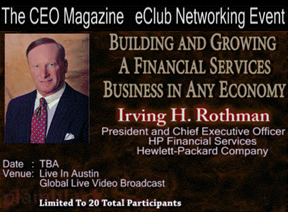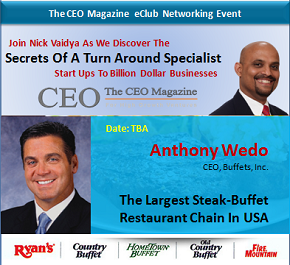Jenny Q. Ta, CEO, Sqeeqee
Businesses fail for all sorts of reasons: poor planning, lack of cash flow, not understanding the market, treating customers poorly and much more.
As a successful entrepreneur, author and CEO of Sqeeqee, the first-of-its-kind social networthing® site, I have found that these are the five common mistakes that entrepreneurs make:
Underestimating how much time, money and effort is needed to start a business
Starting up business takes a great deal of time, effort and money, more than most entrepreneurs realize. Whether it's dealing with issues and problems, getting everything in place, finding the right people to work with, or something else. You can expect all of your resources and planning to be stretched.
You need to make sure that your estimates, targets and business plans are flexible. A good rule of thumb is to assume that everything you do to start up your business will take 20% - 30% more time, effort or money than you expect. Your business plans, resources and practices should reflect that.
Not researching the market and believing that people will buy your product or service
The phrase 'If you build it, they will come' simply does not apply in business. When people are voting with their wallets, they are only going to spend money on products and services that fulfill some sort of need. One of the main mistakes of inexperienced entrepreneurs is that they don't do the research to establish whether a product or service is actually useful to anyone; they build it, launch it... and get no customers. This comes down to one very simple thing: market research.
Before you commit to developing a product or service, you need to validate your idea through market research. You need to identify your target audience and find out from them if what you are planning is something that they actually need and would spend money on. Don't make the mistake of asking your friends or family; you need to ask the people that you'll be relying on to spend their hard-earned cash on your business - your potential customers.
Not launching soon enough
You're not going to make any money from your business until you have a product or service out there for people to buy. Many entrepreneurs get stuck in 'analysis paralysis' where they spend months analyzing what they should be doing; they test, tweak, iterate, test and tweak again, without making anything publicly available. While is it vital to have a good strategic plan and a way to reach your market, you shouldn't hold off of launching because of fear, anxiety or concern that not everything is 'perfect'.
You can avoid this by having some courage and confidence in your product and releasing something that is 'good enough' and relatively feature complete. You can then learn from the product, iterate over time and refine it into something amazing. Don't be afraid to make mistakes: the best entrepreneurs learn from them. However, as the next point shows, you shouldn't launch before you are ready.
Launching too soon
In contrast to the previous point, another common mistake is launching too early. A shoddy product or service that's not fit for purpose will create angry customers, a bad public image and will be hard to recover from. Don't let impatience cause you to rush into getting something onto the market as quickly as possible.
That's why it's important not to launch too soon. You need to make sure that what you're building has the right balance between quality, ease of use, features and value for money. This will come from analyzing your market, testing your product out with focus groups, looking at feedback and your own internal testing.
Not listening to customers
Customers are the single most important factor in having a successful business. You ignore customers at your peril; they can provide great feedback, be advocates for your business and also add directly to your bottom line through repeat or ongoing purchases.
Treat your customers well by providing good after sales care, having effective customer service in place and letting them know what they need to do if they have any issues or problems.
In closing
Although there's no surefire route to success in business, the mistakes above probably account for around 90% of the failures of small businesses. If you can look at each of these areas in detail and take practical steps to avoid these mistakes, you'll have a much stronger foundation for your business, a greater chance of being a successful entrepreneur and a way to turn your business dreams into reality.
About the Author
 Jenny Q. Ta is the founder and CEO of Sqeeqee, the first-of-its-kind social networthing™ site. Launched in 2014, the site gives individuals, businesses, celebrities, politicians, and non-profit organizations the ability to monetize their profiles in unprecedented ways.
Jenny Q. Ta is the founder and CEO of Sqeeqee, the first-of-its-kind social networthing™ site. Launched in 2014, the site gives individuals, businesses, celebrities, politicians, and non-profit organizations the ability to monetize their profiles in unprecedented ways.
Ms. Ta is a seasoned entrepreneur with two successful ventures to her credit. She was the Founder and CEO of Titan Securities, a full service investment firm that she grew to more than $250 million in assets and was acquired in 2005. Prior to founding Titan Securities she was the driving force behind Vantage Investments, a full-service broker-dealer start-up she founded in 1999 at the age of 27.
Jenny is also an author whose book, Wall Street Cinderella, will launch in 2014 detailing her escape from Vietnam during the war and her path to success from welfare to Wall Street. As a self-made millionaire by the time she was 27, the book will serve as a roadmap for women looking at a business career.

 Jenny Q. Ta is the founder and CEO of Sqeeqee, the first-of-its-kind social networthing™ site. Launched in 2014, the site gives individuals, businesses, celebrities, politicians, and non-profit organizations the ability to monetize their profiles in unprecedented ways.
Jenny Q. Ta is the founder and CEO of Sqeeqee, the first-of-its-kind social networthing™ site. Launched in 2014, the site gives individuals, businesses, celebrities, politicians, and non-profit organizations the ability to monetize their profiles in unprecedented ways. 












